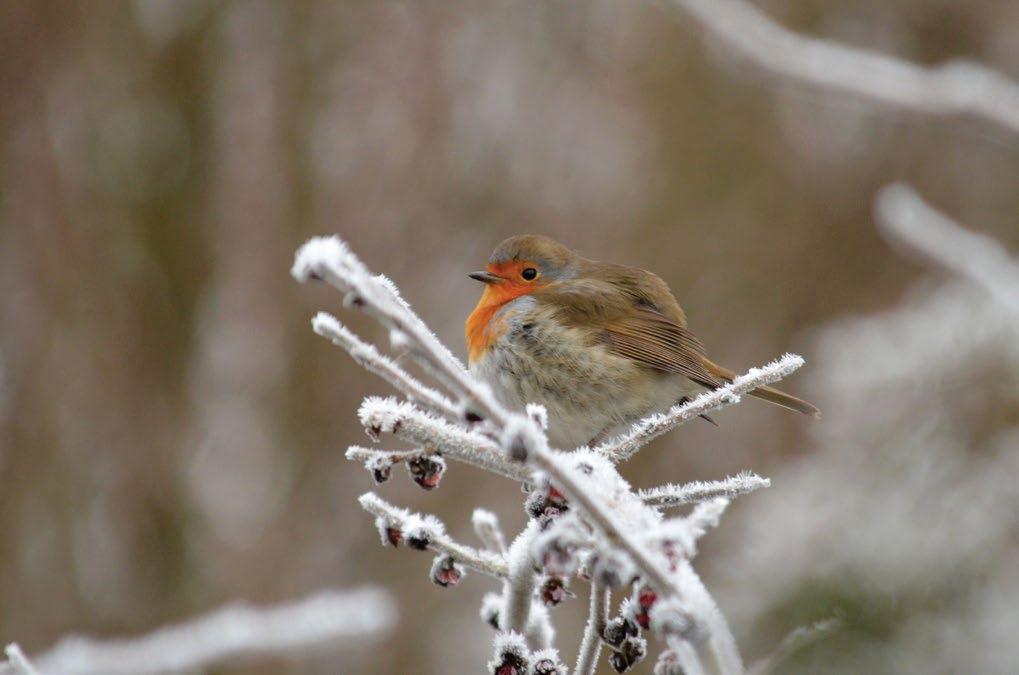
3 minute read
Nature Notebook
Robins Rule
Think of Christmas, think of wildlife and you’ll no doubt think of robins. These ubiquitous garden birds are a firm seasonal favourite.
Advertisement
KEEP UP TO DATE Worcestershire Wildlife Trust @WorcsWT t worcestershirewildlifetrust G worcswildlifetrust.co.uk w Recently voted Britain’s favourite bird, robins are one of our most recognisable and most common birds. Many people are delighted by ‘their’ robin that visits the garden, allotment, balcony or other outdoor space.
Many readers will probably be astounded to know that it isn’t just one robin that visits your garden, even though you may only see one at any given time. In a project in north Norfolk to track which blackbirds were using which gardens, a daily record was set by one garden that had 74 individual blackbirds pay a visit.
Back to robins and did you know that the robins in your garden may not all be the same ones that have been with you all summer? During autumn, the UK sees an influx of robins from Scandinavia – some will continue to France and Spain but others will pause and spend the winter with their British relatives. There are subtle differences in the colour of the feathers that can help you to identify our continental robin cousins but I think you have to have better trained eyesight than I’ve got!
Robins are one of few birds whose song fills the air during winter, most other birds only sing when they’re wooing a mate for breeding in the spring. They’re also unusual in that both males and females sing during the winter months, although neither sing the fullblown spring song. Part of the reason for singing is to defend a territory. Territorial patches are important at this time of year as that’s how birds ensure access to the food needed to get them through each cold night. Robins are often aggressive towards one another and fights to the death do occasionally happen. Despite this, robins will tolerate other birds where needs must!
The oldest known robin was over eight years old but most have an average lifespan of just two years. Cold winters, predators, food shortages and disease all take their toll but you can help these beautiful birds and their feathered friends by popping out some food during winter and putting up a birdbox in your outdoor space. If you’ve got a creeper growing up a wall, why not tuck an open-fronted box in amongst the vegetation – as it leafs-up in spring, it will provide a perfectly hidden and sheltered spot for one of your neighbourhood robins to breed in. Perhaps you could ask Santa for a box for Christmas?
Robins are such a welcome sight when we see them in our gardens so pop out some food, provide a home and give them as much cheer as they give us.
Our friends at Vine House Farm donate 4% of every sale and £10 for new customers to Worcestershire Wildlife Trust – why not check out their food, feeders and nest boxes www.vinehousefarm.co.uk
Christmas cards, calendars and gifts from our online shop help wildlife near you www.worcswildlifetrust.co.uk/shop n Wendy Carter, Worcestershire Wildlife Trust


Merry Christmas to all of our readers

Worcestershire Now
Rachel Seabright Tel: 01905 727900 Email: rachel@pw-media.co.uk
If you would like to advertise in our next issue please contact our sales team.
Lis Gardner Tel: 01905 727901 Email: lis@pw-media.co.uk Kate Gilmartin Tel: 01905 727905 Email: kate@pw-media.co.uk






